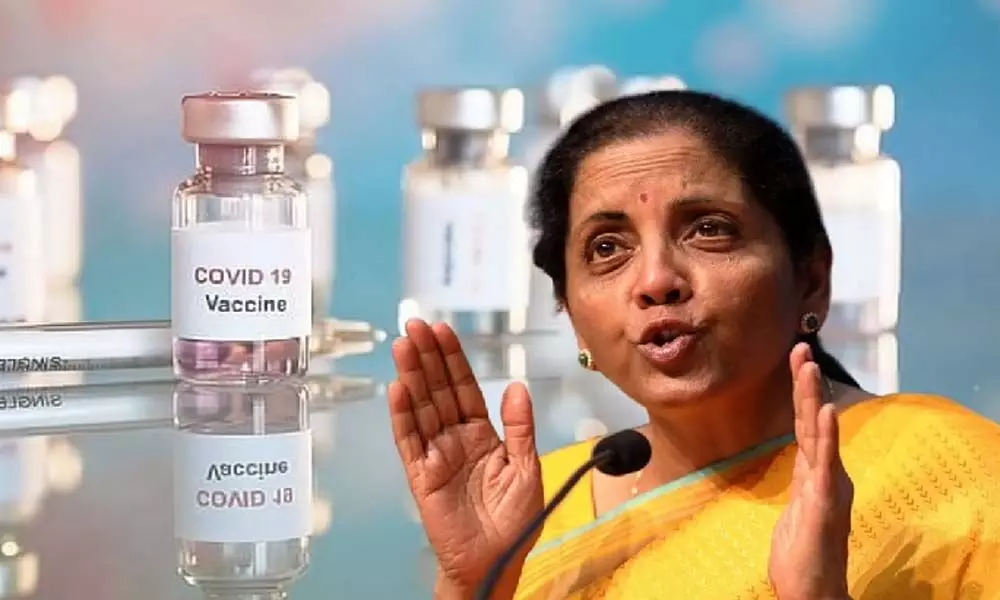Live
- Vizag mafia rules sand ramps in Srikakulam district
- Unselfishness is a Lie
- ICTPL welcomes maiden vessel MV KSL Fuyang
- BJP leaders mock Rahul's speech
- Analysing Happiness
- Two-day ToT organised for trainers
- Savarkar preferred Manusmriti to Constitution: Rahul
- Daily Horoscope for 15 December 2024: Embrace Today’s Insights of Your Zodiac Sign and Unlock Your Potential.
- Beyond The Flames
- CM warns officials of stringent action
Just In
GST rates on Covid items slashed; vaccine still taxed at 5%


GST rates on Covid items slashed; vaccine still taxed at 5%
Amid calls for lower levies on items and medicines required in Covid-19 treatment, the GST Council on Saturday decided to slash rates of several Covid-relief items to 5 per cent from existing 12-18 per cent levels, although it kept the much talked-about tax rate on vaccines unchanged at 5 per cent.
New Delhi : Amid calls for lower levies on items and medicines required in Covid-19 treatment, the GST Council on Saturday decided to slash rates of several Covid-relief items to 5 per cent from existing 12-18 per cent levels, although it kept the much talked-about tax rate on vaccines unchanged at 5 per cent.
Addressing the media post the GST Council meet, Finance Minister Nirmala Sitharaman said that the council agreed to go with the recommendations of the Group of Ministers (GoM) that was single point agenda on the council on Saturday.
She said that while rate of tax on various Covid relief medical items has been reduced, no change had been made in 5 per cent GST rate on vaccines but it would not impact the public as vaccination is being provided for free.
Sitharaman said that Centre will be paying and receiving 75 per cent of all the tax collected on it, which will be further distributed with states. She had earlier said that exempting vaccines from GST would deny input tax credit on raw material and supplies that could impact its pricing.
As part of Covid relief measures, the 44th meeting of the GST Council reduced GST rate on Remdesivir to 5 per cent from 12 per cent and that of medical grade oxygen to 5 per cent.
The council has also reduced the rates on Amphotericin B, medicine used for black fungus and brought it to nil level exempting 5 per cent rate.
The tax rate on Tocilizumab, used for treatment of Covid-19 has also been waived off. The previous tax rate was 5 per cent.
The rate on anti-coagulants like Heparin has also be been slashed to 5 per cent.
Further, the council headed by the Finance Minister also decided that the tax rate on any other drug recommended by Ministry of Health and Family Welfare (MoHFW) and Department of Pharma (DoP) for Covid treatment, would be kept at 5 per cent.
In terms of life saving equipment and products, low availability of which caused a lot of panic across the country, both in the first and the second wave including medical grade oxygen, oxygen generators and ventilators, have also been reduced.
GST on medical grade oxygen, oxygen concentrator, generators, including personal imports, ventilators, BiPAP Machines and high flow nasal canula device has been reduced from 12 per cent to 5 per cent.
Low availability of medical grade oxygen in hospitals was witnessed during the initial period of the second wave of Covid-19 and in the first wave, it was the lack of ventilators which was a grave concern in the country.
Rates of pulse oximeters, hand sanitisers, temperature check equipment, gas, electric or other furnaces for crematorium, including their installation among others have also been reduced to 5 per cent.
Now, Covid testing kits too would be taxed at 5 per cent, against the previous rate of 12 per cent.
In another major move, the GST rate on ambulances has been reduced to 12 per cent from the previous 28 per cent.
The special duty cuts would be applicable till September 30, 2021. Sitharaman said that though GoM recommended the rate cuts till August, the council decided to keep it till September ended and will later decide if further extension is required.
Commenting on the decisions, M.S. Mani, Senior Director of Deloitte India said: "While the reductions on medication and equipment are good welfare measures, curtailment of the exemption period would make it difficult for businesses to plan new investments and expand their supply chains in order to ensure that they reach all corners of the country."
"Businesses engaged in their manufacture and trading would hope that the period is extended beyond September 30," Mani said.

© 2024 Hyderabad Media House Limited/The Hans India. All rights reserved. Powered by hocalwire.com






